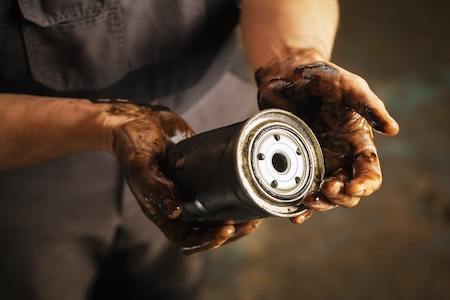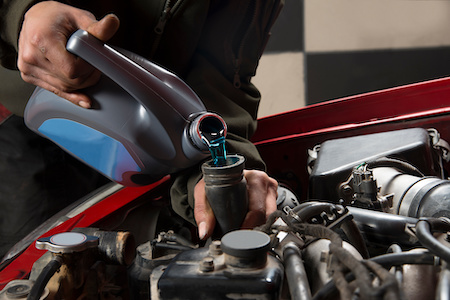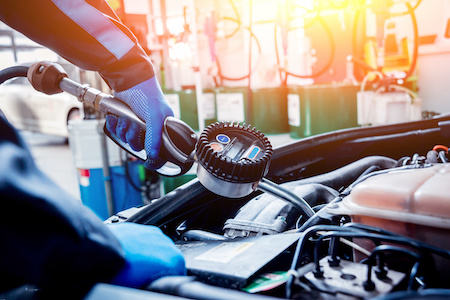You’ve heard it before: “Get your oil changed regularly.” Through flyers, ads, and TV commercials, the message is delivered ad nauseam.
But let’s be honest, when life gets busy, it’s easy to put off. Maybe you’re overdue by a few hundred miles, or maybe that sticker on your windshield has completely faded. We get it.
Still, skipping oil changes is one of the fastest ways to shorten your vehicle’s life and invite expensive engine trouble down the line. And here in Denver, with our unique climate swings and mountain driving, keeping up with routine maintenance like oil changes isn’t just a good idea, it’s a must.
Here are the top benefits of getting regular oil changes in Denver and why your engine will thank you.
Keeps Your Engine Running Smoothly
Your car’s engine is made up of many fast-moving parts. Oil acts as a lubricant, keeping those parts gliding smoothly without grinding or seizing up.
Over time, engine oil breaks down, thickens, and collects dirt and debris. That old, dirty oil can’t lubricate as well, which leads to friction, overheating, and wear and tear on vital engine components.
Fresh oil = smoother performance. It gives your engine a breath of fresh air—something it needs to function at its best.
Improves Fuel Efficiency
Dirty oil creates drag inside your engine. That means your car has to work harder to go the same distance, which lowers fuel efficiency.
Getting regular oil changes helps maintain optimal engine performance, and that translates to better gas mileage. And with gas prices always fluctuating, every little bit counts.
Regular oil changes = more miles per gallon = more money in your pocket.
Extends the Life of Your Engine
An oil change might cost a few bucks, but a new engine? That’ll run you thousands.
Clean oil keeps internal engine components from wearing out prematurely. It also reduces the buildup of sludge, which can block important oil passages and destroy your engine over time.
Think of it as preventive medicine. Routine oil changes are one of the most cost-effective ways to make sure your vehicle stays on the road for years to come.
Prevents Overheating
In addition to lubricating the engine, oil helps dissipate heat. As it flows through the engine, it draws heat away from critical areas.
But once oil starts to degrade, it can’t manage temperatures effectively, especially when you’re climbing I-70 to the mountains or stuck in stop-and-go Denver traffic on a hot day.
Regular oil changes keep your engine running smoothly, no matter the conditions.
Reduces Harmful Emissions
When oil gets old and dirty, it thickens and creates sludge. That sludge can cause your car to burn oil, leading to more smoke and harmful emissions.
Clean oil means a cleaner-running engine, which is better for your car, your wallet, and our Colorado air.
If your vehicle is due for an emissions test (as required in Denver), fresh oil can help ensure you pass without any surprise delays.
Protects Your Turbocharger (If You Have One)
If you drive a newer Honda, Toyota, or Subaru model equipped with a turbocharged engine, regular oil changes are even more critical.
Turbochargers spin at incredibly high speeds—up to 200,000 RPM. That’s not a typo. These systems rely on a steady flow of clean oil to avoid heat damage and friction.
Miss an oil change, and that turbo can suffer premature wear or even fail completely. That’s not a cheap fix.
Catches Bigger Problems Early
During an oil change, experienced technicians don’t just swap out the oil and call it good. They also check for signs of leaks, fluid levels, belt wear, and other potential issues.
It’s a chance to catch developing problems early, before they leave you stranded on the side of I-25 with steam pouring out from under the hood.
Why It Matters Even More in Denver
Living in the Mile High City comes with some added pressure on you and your car. Denver drivers deal with:
- Higher elevations, which mean thinner air and harder-working engines
- Temperature swings, from freezing mornings to blazing afternoons
- Mountain driving, which puts strain on engines, brakes, and cooling systems
- Stop-and-go urban traffic, which shortens the useful life of engine oil
- Road treatments in winter, which increase engine and undercarriage corrosion
In short: Denver is rough on cars.
That’s why skipping oil changes here is riskier than in more moderate climates. If you want your car to thrive in Colorado, oil maintenance is non-negotiable.
How Often Should You Change Your Oil?
The old rule of thumb was every 3,000 miles, but that’s no longer true for all vehicles.
Modern synthetic oils and engines can often go 5,000 to 7,500 miles, sometimes more, depending on the make, model, and driving conditions.
Still, Denver’s environment can shorten oil life. If you regularly:
- Drive in stop-and-go traffic
- Take short trips
- Tow or haul gear
- Climb mountain roads
- Face cold starts in winter
…then it’s smart to stick to the lower end of that range.
Not sure? Just ask. We’ll check your vehicle manufacturer’s guidelines and help you set a personalized maintenance schedule.
Why Choose a Family-Owned Shop for Your Oil Change?
We’re the first to tell you that we’re not a national chain. We’re a trusted, family-owned shop serving the Denver community for years. That means:
- No upsells
- No gimmicks
- No rush jobs
Just honest oil changes, clear communication, and a friendly face you’ll recognize each time you come in.
We’ll help you understand exactly what your car needs—and what it doesn’t. And if you’re ever unsure about a dashboard light, strange sound, or weird smell, we’re just a phone call away.
Ready for Your Next Oil Change?
If it’s been a while since your last service, don’t wait. Regular oil changes are quick, affordable, and one of the best ways to protect your investment.
Take care of your car, and it’ll take care of you. Schedule your next oil change today. We’ll get you in, out, and back on the road with confidence.










